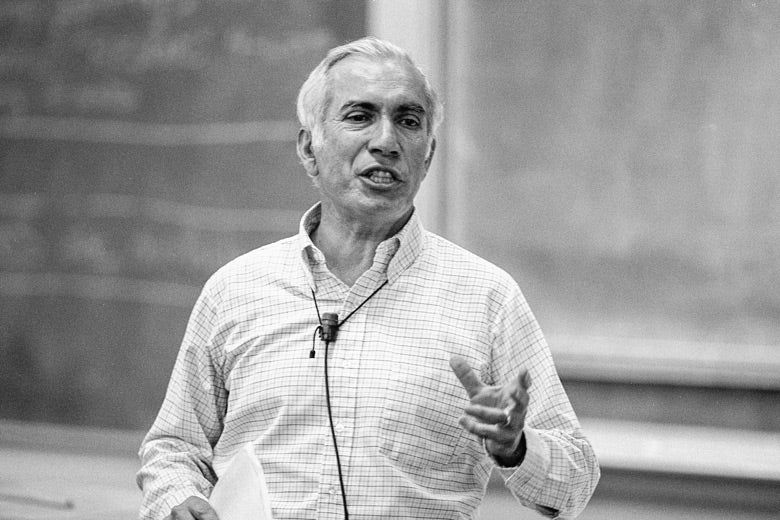Stanford sociologist and faculty leader Sanford Dornbusch dies at 89
Sanford M. Dornbusch, a scholar renowned for his research on adolescence, was a “founding father” of Stanford’s Department of Sociology.
Sanford M. Dornbusch, a pioneer in sociology at Stanford University, died Feb. 9 in Palo Alto after a bout with cancer. He was 89.

Sanford Dornbusch, whose long career shaped sociology at Stanford, was a prominent voice in the Faculty Senate. (Image credit: Chuck Painter)
Dornbusch was the Reed-Hodgson Professor in Human Biology, Emeritus, and a professor emeritus of sociology. He was hired as chair of the Stanford Sociology Department in 1959, launching a prolific career that shaped Stanford sociology for decades to follow. Dornbusch retired in 1995.
His research interests were in social psychology, the sociology of education, and adolescence, including the impact of divorce on adolescents; factors involved in the academic performance of Chicano students; and the evolution of family structures.
“Sandy’s commitment, energy and enthusiasm will be missed by all those who worked with him,” said W. Richard Scott, professor emeritus of sociology, who was his close friend and colleague. “He was a popular figure on campus, a happy warrior who worked tirelessly to strengthen the sociology program at Stanford.”
Dornbusch is commonly known as one of Stanford sociology’s “founding fathers.” When hired at Stanford, he was allowed to bring with him several professors: Scott, Joe Berger, Frank Camilleri, Morris “Buzz” Zelditch and Bernie Cohen, all of whom contributed to building a nascent department that had been formed in 1948.
Scott later wrote in an article for the American Sociological Association that Stanford’s hiring of Dornbusch reflected a “serious investment” by the university in the future of sociology.
“This was the event – a moment of reorganization and renewal which launched the modern era of sociology at Stanford,” he wrote.
Opposed loyalty oath
Dornbusch was a prominent voice in Stanford’s Faculty Senate and was among those who in the early 1960s successfully opposed the university’s adoption of a “loyalty oath” to the U.S. government. In 1970, he traveled with other Stanford scholars and students to Washington, D.C., to meet with politicians on the Vietnam War and academic freedom.
Dornbusch was a founding member of Stanford’s Program in Human Biology, served as director of the Stanford Center for the Study of Families, Children and Youth; founded and directed Stanford’s Curriculum on Children and Society; and co-founded Stanford’s Center on Adolescence. He was also a member of first class of fellows at Stanford’s Center for Advanced Study in the Behavioral Sciences in 1954-55.
“Sandy will be deeply missed by colleagues and students of Stanford University, but his spirit will continue forever in human biology,” said Paul Graham Fisher, a professor of neurology and of pediatrics, and the Bing Director of the Program in Human Biology.
Fisher said Dornbusch spoke his mind on anything, “without rancor or animosity,” and was a man of strong character.
“He never promoted himself, but worked for the common good,” Fisher said. “His knowledge and wit were highlights of my undergraduate education at Stanford. Imagine a Stanford scholar who could mesmerize 200 sophomores in the core while lecturing on the ‘tragedy of the commons’ and make the topic funny,” said Fisher.
Born on June 5, 1926, in New York City, Dornbusch went to college on the G.I. Bill after serving in three branches of the U.S. military: the Army, Navy and Coast Guard, according to Scott. Dornbusch earned his doctorate in sociology from the University of Chicago in 1952.
His first academic post was on the sociology faculty at Harvard University. He moved on to the University of Washington before being tapped by Stanford.
Dornbusch’s authored and co-authored books include Beyond the Classroom (1966), A Primer of Social Statistics (1955), Evaluation and the Exercise of Authority (1975), Feminism, Children and the New Families (1988), Popular Religion (1974) and Popular Psychology (1962).
He is survived by his wife, Barbara Dornbusch, an artist; two sons, Steven and Jeffrey; and two grandchildren, Hannah and Leah.
Memorial reception, donations
A memorial reception for Dornbusch will be held from 4-6 p.m. on April 7 in the Faculty Club’s Red and Gold Lounge. Remarks will be made at 4:30 p.m. The Sociology Department, the Program in Human Biology and the Art & Art History Department are sponsoring the reception.
In lieu of flowers, the Dornbusch family asks that donations be sent to the Barbara and Sandy Dornbusch Fund, which benefits activities in sociology, human biology and art on campus. To do so, send an email to development-services@lists.stanford.edu or call (650) 725-4360.
